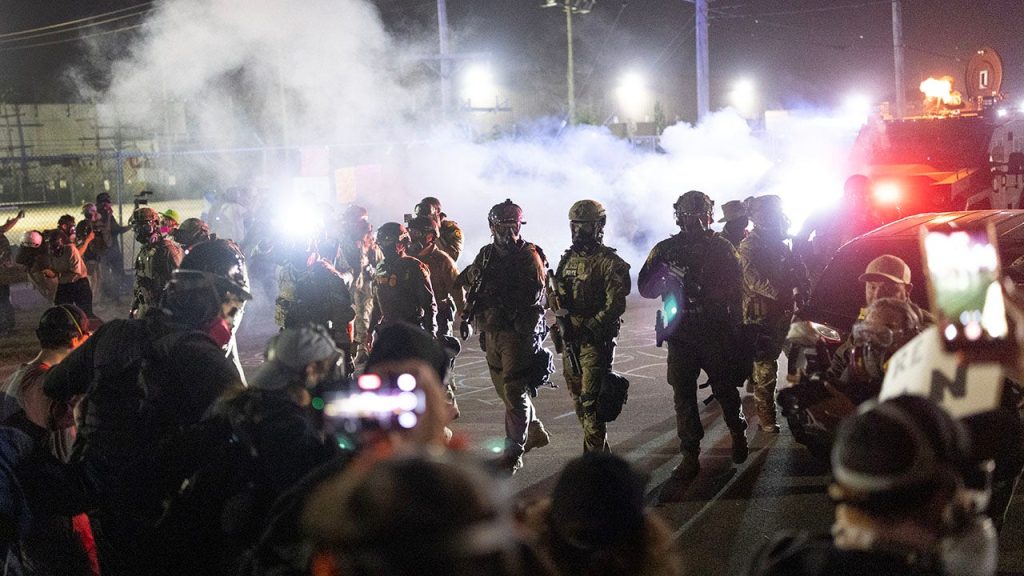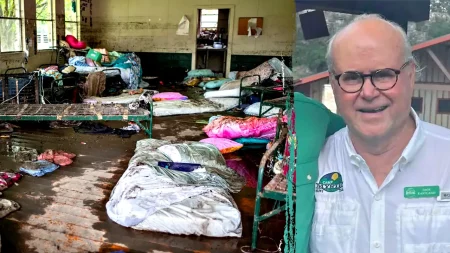National Guard Troops Arrive in Illinois Amid Immigration Tensions
In a significant development that has heightened political tensions across the nation, Texas National Guard troops arrived in Illinois on Tuesday to protect federal personnel and property amid ongoing anti-immigration protests. The Pentagon confirmed that approximately 200 guardsmen have been mobilized for an initial 60-day period to support what they’ve termed the “Federal Protection Mission.” This deployment comes after concerning incidents near an Immigration and Customs Enforcement (ICE) facility in Broadview, where about a dozen protesters have been arrested during days of demonstrations.
The situation escalated dramatically after Department of Homeland Security Secretary Kristi Noem announced on Saturday that additional special operations personnel would be deployed following troubling incidents where federal agents were reportedly rammed and boxed in by multiple vehicles. Fox News cameras captured footage of National Guard troops at the Army Reserve Training Center in Elwood, just south of Joliet. Texas Governor Greg Abbott publicly supported the deployment on social media platform X, stating that service members are “on the ground and ready to go” and “putting America first by ensuring that the federal government can safely enforce federal law.” This deployment represents a significant escalation in federal response to immigration protests and has ignited fierce debate about jurisdiction, states’ rights, and the proper role of military personnel in civilian matters.
Chicago’s leadership has responded with firm opposition to the National Guard presence. Mayor Brandon Johnson has taken a strong stance against the deployment, describing it as “illegal, unconstitutional, dangerous and wrong.” In a direct challenge to federal authority, Johnson signed an executive order on Monday creating “ICE-free zones” that prohibit federal immigration agents from using city-owned property for immigration enforcement operations. During a subsequent news conference, the mayor framed the issue in stark terms, calling on “the Trump administration” to “end the war on Chicago” and “end its attempt to dismantle our democracy.” This confrontational approach highlights the growing divide between federal immigration enforcement priorities and the sanctuary city policies adopted by many major urban centers across the United States.
Community response has been equally forceful, with activist groups mobilizing to resist what they view as federal overreach. The Coalition Against the Trump Agenda (CATA), a Chicago-based activist group, planned an emergency protest in downtown Chicago for Wednesday afternoon. Hatem Abudayyeh, National Chair of the U.S. Palestinian Community Network and a CATA spokesperson, told Fox News Digital that they “stand united in fighting back against [President Donald] Trump’s racist and white supremacist attacks on our communities.” Abudayyeh characterized the Guard’s deployment as being sent “to join ICE in wreaking havoc and terrorizing our neighborhoods,” while asserting that “Chicagoans don’t back down from bullies like Trump.” This response illustrates how immigration enforcement has become deeply intertwined with broader political and social justice movements across the country.
The confrontation in Illinois emerges against a backdrop of increasing immigration enforcement operations nationwide. Just recently, hundreds of federal agents in Chicago carried out operations targeting suspected members of the Tren de Aragua gang, raising questions about the timing and coordination of federal immigration activities. Community organizations have responded by organizing resistance efforts, including protests, community education, “Know Your Rights” presentations, and rapid response teams led by the Illinois Coalition for Immigrant and Refugee Rights that aim to directly defend immigrants from ICE enforcement actions. Activists have pledged to “continue to resist together, unified across race and class and nationality,” suggesting that tensions are unlikely to subside in the near term regardless of the National Guard presence.
This standoff between state and federal authorities in Illinois exemplifies the profound divisions in American politics and governance regarding immigration policy. With Governor Abbott deploying troops from Texas to Illinois, and Mayor Johnson creating “ICE-free zones” in direct opposition, Americans are witnessing an unprecedented jurisdictional clash that tests the boundaries of federalism and state sovereignty. As protesters gather and community organizations mobilize, the deployment of National Guard troops to support immigration enforcement has transformed what was already a contentious policy debate into a potential constitutional crisis. With strong positions on both sides and emotions running high, how this situation unfolds in the coming days may set important precedents for federal-state relations and immigration enforcement across the United States for years to come.











